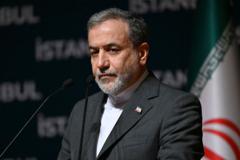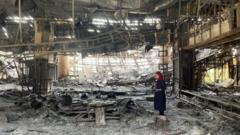Iranian Foreign Minister Abbas Araghchi confirmed extensive damage to the country's nuclear sites following recent US and Israeli bombings, despite the Supreme Leader's assertion that the attacks wouldn't disrupt Iran's nuclear progress. Discussions to resume nuclear negotiations have been halted as Iran faces scrutiny over its nuclear intentions.
Iranian Foreign Minister Acknowledges Significant Damage to Nuclear Facilities

Iranian Foreign Minister Acknowledges Significant Damage to Nuclear Facilities
Abbas Araghchi reveals "serious" impacts from US-Israeli strikes, contradicting Supreme Leader Khamenei's claims.
Iran's foreign minister has openly acknowledged that the nation’s nuclear sites have sustained "excessive and serious" damage due to recent air strikes carried out by the United States and Israel. In a statement to state media, Abbas Araghchi revealed that the Atomic Energy Organisation of Iran is currently assessing the extent of the damage. This admission comes in stark contrast to remarks made earlier by Iran’s Supreme Leader Ayatollah Ali Khamenei, who maintained that the strikes had not significantly impacted the nuclear program. Khamenei responded to US President Donald Trump's claims of complete destruction at three sites, asserting that the attacks failed to achieve notable results and that Iran had effectively triumphed in the conflict.
The foreign minister's comments suggest a troubling outlook as he stated that there are no intentions to resume stalled nuclear negotiations with the US, which were initially set to continue with a sixth round of discussions prior to the escalation of hostilities. Araghchi emphasized that the Iranian government is solely focused on what serves the best interest of Iranian citizens and hinted at a shift in their diplomatic approach, though specifics on this shift were not provided.
In efforts to revive talks, the Trump administration had proposed easing sanctions in exchange for Iran’s cooperation on a civilian nuclear energy initiative, reportedly involving an estimated $30 billion investment. However, developments in Iran could complicate this proposal, especially after the Iranian parliament approved a bill to cease cooperation with the International Atomic Energy Agency (IAEA). Such a move would jeopardize Iran’s commitment to allowing international inspectors access to its nuclear sites.
Israel has justified its military action as a necessary measure to counter Iranian ambitions concerning nuclear weapons, while Iran has consistently claimed its nuclear pursuits are intended for peaceful purposes. Just over the past weekend, US forces became directly engaged in the conflict, targeting key facilities in Fordo, Natanz, and Isfahan, before Trump sought to mediate a ceasefire.
Amid these tensions, US Defense Secretary Pete Hegseth indicated that intelligence reports suggest the strikes caused substantial setbacks to Iran's nuclear program, potentially delaying it for years. Yet, a leaked preliminary assessment from the Pentagon downplayed the severity of this damage, claiming it only delayed Iran’s nuclear ambitions by a few months—a contention that the current administration has rebuffed. Meanwhile, casualty reports indicate that 610 individuals lost their lives due to the twelve days of air strikes from Israel, whilst Israeli sources cite 28 fatalities within their borders. As Tehran grapples with its new reality, the citizens remain in a state of distress.
The foreign minister's comments suggest a troubling outlook as he stated that there are no intentions to resume stalled nuclear negotiations with the US, which were initially set to continue with a sixth round of discussions prior to the escalation of hostilities. Araghchi emphasized that the Iranian government is solely focused on what serves the best interest of Iranian citizens and hinted at a shift in their diplomatic approach, though specifics on this shift were not provided.
In efforts to revive talks, the Trump administration had proposed easing sanctions in exchange for Iran’s cooperation on a civilian nuclear energy initiative, reportedly involving an estimated $30 billion investment. However, developments in Iran could complicate this proposal, especially after the Iranian parliament approved a bill to cease cooperation with the International Atomic Energy Agency (IAEA). Such a move would jeopardize Iran’s commitment to allowing international inspectors access to its nuclear sites.
Israel has justified its military action as a necessary measure to counter Iranian ambitions concerning nuclear weapons, while Iran has consistently claimed its nuclear pursuits are intended for peaceful purposes. Just over the past weekend, US forces became directly engaged in the conflict, targeting key facilities in Fordo, Natanz, and Isfahan, before Trump sought to mediate a ceasefire.
Amid these tensions, US Defense Secretary Pete Hegseth indicated that intelligence reports suggest the strikes caused substantial setbacks to Iran's nuclear program, potentially delaying it for years. Yet, a leaked preliminary assessment from the Pentagon downplayed the severity of this damage, claiming it only delayed Iran’s nuclear ambitions by a few months—a contention that the current administration has rebuffed. Meanwhile, casualty reports indicate that 610 individuals lost their lives due to the twelve days of air strikes from Israel, whilst Israeli sources cite 28 fatalities within their borders. As Tehran grapples with its new reality, the citizens remain in a state of distress.





















